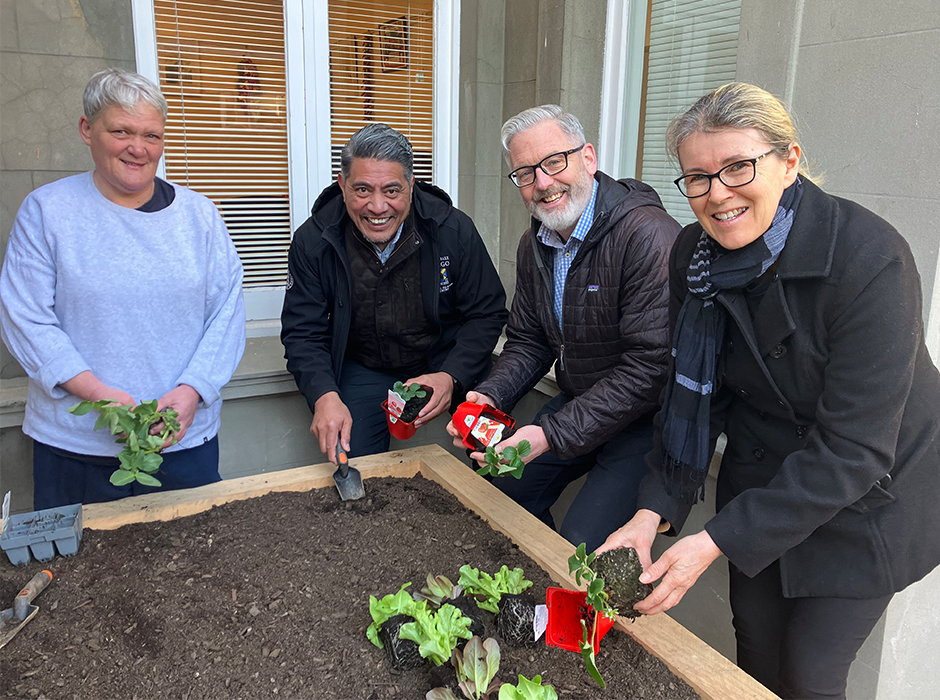
Hands on with starting a new garden … (from left) Department of Human Nutrition Professional Practice Fellow Nichola Agnew, Pacific Islands Centre manager Tagiilima Feleti, Sustainability Office Head Dr Ray O’Brien, and Department of Human Nutrition Senior Professional Practice Fellow Mary Spiers.
New collaborative gardens on the Dunedin campus aim to show students the journey from garden to plate, supply a campus food truck, let students teach their peers to grow food, help Pacific students feel at home, and feed students.
The raised gardens and tunnel house in Castle and St David Streets are a community effort involving the Department of Human Nutrition, Sustainability Office, Pacific Islands Centre, Property and Campus Development, and Agricultural Innovation.
The gardens sprouted from a passion for people eating nourishing food and creating food supply security as the cost of living rises
Human Nutrition Senior Professional Practice Fellow Mary Spiers’ clear objectives for the raised gardens and tunnel house in Castle and St David Streets are that they:
- Help students learn how easy and much cheaper it is to grow vegetables.
- Supply her cooking classes that teach students how to eat healthily on a budget without expensive equipment or complex recipes.
- Supply the food truck her department’s students run on campus to provide reasonably priced, nourishing food.
- Feeds students with any surplus.
Second-year students often have a reputation for eating noodles and not much else as they flat for the first time while studying and socialising, Mary says. So she wants to break down any barriers to them growing herbs in pots on a windowsill or spinach in a garden because young adulthood is a time people develop lifelong habits.
“It’s about $4 for fresh herbs in the supermarket and you can buy a packet of seeds for about $3 and get 60 seeds or more.”
However, while she and Professional Practice Fellow Nichola Agnew had the vision for gardens, they did not have the contacts so approached Sustainability Office Head Ray O’Brien who had already created vegetable gardens for Otago’s residential Sustainability Neighbourhoods.
He not only brought in Gardening and Grounds Foreman Andy Laing for garden beds and Agricultural Innovation on campus for heritage apple trees, but also Human Nutrition’s neighbour, the Pacific Islands Centre.
Mary says bringing all those people together highlighted the University “is a real community and if we are all working together, we can do great things”.
Pacific Islands Centre manager Tagiilima Feleti says the whole idea resonated with “what we do. We’re here to partner … for me, that’s how a community should work”.
“If we need to provide opportunities for students to be more sustainable in how they live and we [the centre] can contribute to that, I’m here to do that whatever it takes.”
The centre already had a good relationship with Human Nutrition and had space for some raised beds outside the centre’s entrance, which is opposite the entrance to Human Nutrition.
Tagiilima says there are plans for how the garden beds could be maintained by volunteer staff and students.
So many Pacific students come from homes where they are used to raising kai (food) to have a sustainable food supply, it will make the centre even more of a home away from home – “they need to feel comfortable, a sense of belonging, whatever they come here for”.
The students can also share their gardening skills with other students and the gardens will make fresh food more accessible for students.
Ray says by combining effort and finances, the gardens had become a reality.
“It’s great to see people working across what can sometimes be barriers on campus.”
The gardens were created with compost made from University grounds and college food waste that went through a digester before being added to the compost, so “we’re starting to see more circularity”, he says.
The heritage apple trees in the gardens will also be studied by Agricultural Innovation students, who will compare them to heritage apple trees already being grown at a higher altitude.